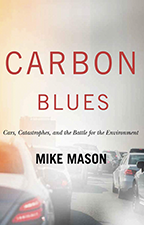
Mike Mason
McGill-Queen’s University Press, 2020; 328 pp;
ISBN: 978-0-2280-0150-8.
By Robin Whitaker
Carbon Blues is a book of ambitious scope. Proceeding via a combination of general timeline and thematic focus, Mason starts with the coal-fired industrial revolution in a short chapter on “The Smog of Capitalism,” moves quickly through “The Scramble for Oil,” then shifts to “Carbon America” — a chapter in which few Canadian politicians emerge looking good. From here, he offers chapters on the expansion of automobiles, climate change denialism (“Exxon knew”), climate-related catastrophes, organized environmentalism, and “Renewables and Remediation.” The concluding chapter, “Reckoning: 2020-2050,” comprises Mason’s perspective on the near future. A chronology covering 1947-2019 is appended to the main text.
Together, Mason promises, these constitute “a short history of climate change, some of its consequences, its deniers, an indication of certain solutions for remediation, and a hint of what lies ahead”. But Carbon Blues is less history in the sense understood by most historians — a sustained accounting for, not merely an account of, “what happened” — than a catalogue of misdeeds and horrors leavened by moments of pushback.
The chapter on “Motoring to Armageddon,” for example, describes the spread of private motor vehicles, the pollution associated with their manufacture and use, and the scandal of “dieselgate”: the use by German carmakers of illegal “defeat devices” to hide the true extent of harmful chemicals emitted in their vehicles’ exhaust. What it does not offer is a systematic analysis of the political forces and specific decisions that engineered automobile dominance. Similarly, while convincing in his observation that even stringently-enforced emissions regulations are no match for the sheer number of vehicles on the road — particularly as SUVs and trucks displace compact cars — Mason offers no clear path “out of this vicious spiral” beyond vague hopes that people may shift to electric vehicles or opt out of car-ownership.
This approach recurs throughout Carbon Blues. Despite the identification of particular agents — the Koch brothers, Exxon’s black ops team, populist and conservative politicians, so forth — it often feels as if things just happened. Environmentalism seemed for a time to be gaining ground as people grasped the effects of DDT, clear-cut logging, and industrial pollution. “Then times changed. In America Ronald Reagan was elected in 1981 and in Britain Margaret Thatcher.… In Canada, environmentalism ran into problems while the bonanza of the tar sands was extolled and successive federal governments, Liberal and Conservative both, got cold feet about environmental protection”.
Rather than presenting new research, the book draws on a wide array of secondary sources, ranging from journalism to political theory to technical reports. Mason’s style is accessible, even breezy, at times verging on wisecracking. These characteristics should make it attractive to students and readers hoping for a grounding in key events and issues. Still, a surprising number of typographical errors and errors of detail made it past the copyeditor. Mason’s timelines are sometimes jumpy. And despite noting a longstanding failure of mass news media to connect the dots between climate change and other issues, Mason treats most of the publications he cites — whether journalistic commentaries or political-economic treatises — as equally straightforward sources of information.
Mason is clearly concerned with and about where we are and where we are headed — and no one but a committed climate-sceptic could make it to the end of Carbon Blues without a reinforced sense that the situation will only get worse if we stay on our current course.
Readers might wish the collation of devastations was organized by a more explicit analytical frame. Carbon Blues underscores the weight of knowledge about the causes and consequences of climate change and what we need to do to contain global temperature rise. At least we know what we need to do in a mechanical sense: stop extracting and burning carbon. In 2020, climate change is less a technical problem than a political one, a matter of hearts and minds and political determination. On this front, Carbon Blues leaves us with more questions than answers.
__________________________________
Robin Whitaker is an associate professor in the Department of Anthropology at Memorial University of Newfoundland and a Member-at-large of the CAUT Executive Committee.